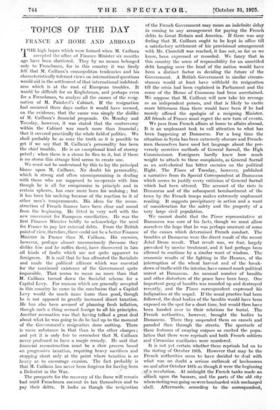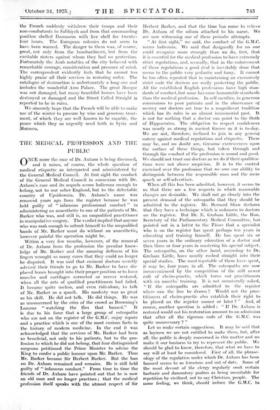TOPICS OF THE DAY
FRANCE AT HOME AND' ABROAD
THE high hopes which were formed when M. Caillaux accepted the office of Finance:Minister six months ago have been shattered. They by no means belonged only to Frenchmen, for in this country it was freely felt that M. Caillaux's cosmopolitan tendencies and his characteristically tolerant views on international questions would aid in the settlement of that international indebted- ness which is at the root of European troubles. It would be difficult for an Englishman, and perhaps even for a Frenchman, to analyse all the causes of the resig- nation of M. Painlowe's Cabinet. If the resignation had occurred three days earlier it would have seemed, on the evidence, that the cause was simply the dislike of M. Caillaux's financial proposals. On Monday and Tuesday, however, it was stated that the controversy within the Cabinet was much more than financial ; that it covered practically the whole field of politics. We shall probably be as near the truth as it is possible to get if we say that M. Caillaux's personality has been the chief trouble. He is an exceptional kind of stormy petrel ; when there is a storm he flies to it, but if there is no storm this strange bird seems to create one.
We must not be understood by this to lay the principal blame upon M. Caillaux. No doubt his personality, which is strong and often uncompromising in dealing with those who are supposed to co-operate with him though he is all for compromise in principle and in certain spheres, has once more been his undoing ; but it has been his undoing because of the reaction to it of other men's temperaments. His ideas for the recon- struction of French finance have been clear and sound from the beginning. He fitted in very well with the new movement for European conciliation. He was the first Finance Minister boldly to acknowledge the need for France to pay her external debts. From the British point of view, therefore, there could not be a better Finance Minister in France than M. Caillaux. His enemies, however, perhaps almost unconsciously (because they dislike him. and he ruffles them), have discovered in him all kinds of faults which are not quite apparent to foreigners. It is said that he has affronted the Socialists and made the political- alliance which was essential for the continued existence of the Government quite impossible. That seems to mean no more than that M. Caillaux turned down the Socialist scheme for a Capital Levy. For reasons which are generally accepted in this country he came to the conclusion that a Capital Levy would do much more harm than good, though he is not opposed to greatly increased direct taxation. He has also been accused of planning fresh inflation, though such a thing seemed foreign to all his principles. Another accusation was that having talked a great deal about what he was going to do he had up to the moment of the Government's resignation done nothing. There is more substance in that than in the other charges ; and yet it is only fair to remember that M. Caillaux never professed to have a magic remedy. He said that financial reconstruction must be a slow process based on progressive taxation, requiring heavy sacrifices and stopping short only at the point where taxation is. so heavy as to encourage evasion. The fact probably is that M. Caillaux has never been forgiven for having been a Defeatist in the War.
The prospects for the recovery of the franc will remain had until Frenchmen consent to tax themselves and to pay their debts. It looks as though the resignation of the French Government may mean an indefinite delay in coming to any arrangement for paying the French debts to Great Britain and America. If there was any feeling that M. Caillaux ought to be kept in office till a satisfactory settlement of his provisional arrangement with Mr. Churchill was reached, it -has not, so far as we know, been expressed or recorded. We fancy that in this country the sense of responsibility for an unsettled debt hanging over the head of the nation would have been a distinct factor in deciding the future of the Government. A British Government in similar circum- stances would at least have withheld its resignation till the crisis had been explained in Parliament and the sense of the House of Commons had been ascertained.
We suppose that M. Caillaux will now take his revenge as an independent person, and that is likely to excite more bitterness than there would have been if he had merely offered the apologia of a resigning. Minister. All friends of France must regret the new turn of events. We pass from French affairs at home to affairs abroad. It is an unpleasant task to call attention to what has been happening at Damascus. For a long time the situation in Syria has been extremely obscure and French- men themselves have used hot language about the per- versely secretive methods of General Sarrail, the High Commissioner. Foreigners hardly knew how much weight to attach to these complaints, as General Sarrail as an anti-clerical has bitter enemies on the political Right. The Times of Tuesday, however, published 'a narrative from its Special Correspondent at Damascus which seems to justify every criticism. of General Sarrail which had been uttered. The account of the riots in Damascus and of the subsequent bombardment of the town by the French troops makes extremely unpleasant reading. It suggests precipitancy in action and a want of consideration for the safety and the property of a very large civil population.
We cannot doubt that the Times representative at Damascus was sure of his facts, though we must allow ourselves the hope that he was perhaps unaware of some of the causes which determined French conduct. The troubles at Damascus were the direct result of the recent Jebel Druse revolt. That revolt was, we fear, largely provoked by unwise treatment, and it had perhaps been allowed to continue by a similar want of wisdom. The economic results of the fighting in the Hauran, of the interruption of the wheat harvest and of the break- down of traffic with the interior, have caused much political unrest at Damascus. An unusual number of bandits and other disturbers of the peace have been busy. - One important gang of bandits was rounded up and destroyed recently, and the Times correspondent expressed his indignation at the sequel. If the usual practice had been followed, the dead bodes of the bandits would have been exposed on the spot for a short time, but would then have been handed over to their relations for burial. The French authorities, however, brought the bodies to Damascus. There they suspended them on camels and paraded then through the streets. The spectacle of these festoons of swaying corpses so excited the popu- lation that there were reprisals and both French soldiers and Circassian auxiliaries were murdered.
It is not yet certain whether these reprisals led on to the rioting of October 18th. However that may be the French authorities seem to have- decided to deal with what was no doubt a serious outbreak of lawlessness on and after October 18th as though it were the beginning or a revolution. At midnight the French tanks made an attack upon the bazaars, and the parts of the old city where rioting was going on werebombarded wiih uncharged shell. Afterwards, according to- the correspondent, the French suddenly withdrew their troops and their non-combatants to Salihiyeh and from that commanding position shelled Damascus with live . shell for twenty- four hours. The European colonies do not seem to have been warned. The danger to them was, of course, great, not only from the bombardment, but from the excitable rioters against whom they had no protection. Fortunately the Arab notables of the city behaved with remarkable courage, consideration and presence of mind. The correspondent evidently feels that he cannot too highly praise all their services in restoring order. The catalogue of destruction is unfortunately a long one and includes the wonderful Azm Palace. The great Mosque was not damaged, but many beautiful houses have been destroyed or damaged and the Street Called Straight is reported to be in ruins.
• We sincerely hope that the French will be able to make use of the winter to procure by wise and generous treat-. ment, of which they are well known to be capable, the peace which they so urgently need both in Syria and Morocco.































































 Previous page
Previous page